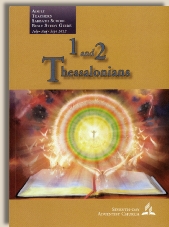|
||||||||||||||
Commentary on "Thessalonica in Paul's Day"
Day 4: Tuesday, July 17, 2012 - The Gospel as a Point of Contact
Overview
Today's lesson surprises us again right from the beginning with a provocative title, "The Gospel as a Point of Contact". Obviously, for those who learned yesterday's lesson there is no surprise, since Cabirus' myth and cult function as the common 'gospel'. Since Cabirus' role in the reception of the gospel had been already discussed, something else should be of concern, namely Paulien's take on 1 Corinthians 9:19-27.
Observations
These verses constitute Jon Paulien's proof that Paul adapted his gospel to the Thessalonian setting to the degree that his approach in that city was "unique." Paul's message was directly adapted to the times of turmoil and change in which Thessalonica was found at his arrival. Cabirus' cult also instilled a spirit of rebellion that Paulien sees in the disorder found in the church which the apostle Paul confronted. It was a mixed blessing: an opportunity for the gospel but also for extreme interpretations of it, for change but also for instability, according to Jon Paulien.
There is little indication that the apostle Paul, in making himself a Jew or a Gentile to win the respective category of people, adapted the gospel's message to the expectations and local aspirations. When Paul's words in 1 Cor. 9:19-27 are read in the preceding local context, it becomes clear that Paul's adaptation was in his willingness to renounce his rights—for example, his right as a preacher of the gospel to get his living by the gospel (1 Cor. 9:14). Paul was free from all, but voluntarily made himself the servant to all (1 Cor. 9:19), a personal decision related to something personal, not at all affecting the message of the gospel itself.
Interestingly, Paulien sees a parallel between Thessalonica and the conversions in his own church:
"Experience has also taught us that people are most open to the Adventist message in times of change." "But people who are baptized in times of dislocation also tend to be unstable, at least at first."
This is not a positive view of his fellow church members, and it may explain why he's reading into the Bible his own limited experience, which, at least, should not be used as a tool for interpreting the Bible.
In the end it's sad that Paulien has a lot of things backwards. He sees the gospel as a point of contact and a factor favorable for the reception of the gospel while reality demonstrates the opposite to be true; he sees Paul as adapting the message of the gospel to a particular setting while he only renounced personal rights and finally reads in the Bible his own experience instead of letting the Bible speak for itself.
Copyright 2012 BibleStudiesForAdventists.com. All rights reserved. Revised July 15, 2012. This website is published by Life Assurance Ministries, Camp Verde, Arizona, USA, the publisher of Proclamation! Magazine. Contact email: BibleStudiesForAdventists@gmail.com.
The Sabbath School Bible Study Guide and the corresponding E.G. White Notes are published by Pacific Press Publishing Association, which is owned and operated by the Seventh-day Adventist church. The current quarter's editions are pictured above.
Official Adventist Resources
Standard Edition Study Guide Week 3
Teacher's Edition Study Guide Week 3
Easy Reading Edition Study Guide Wk 3
Search the Complete Published Ellen G. White Writings
Please Support This Project


